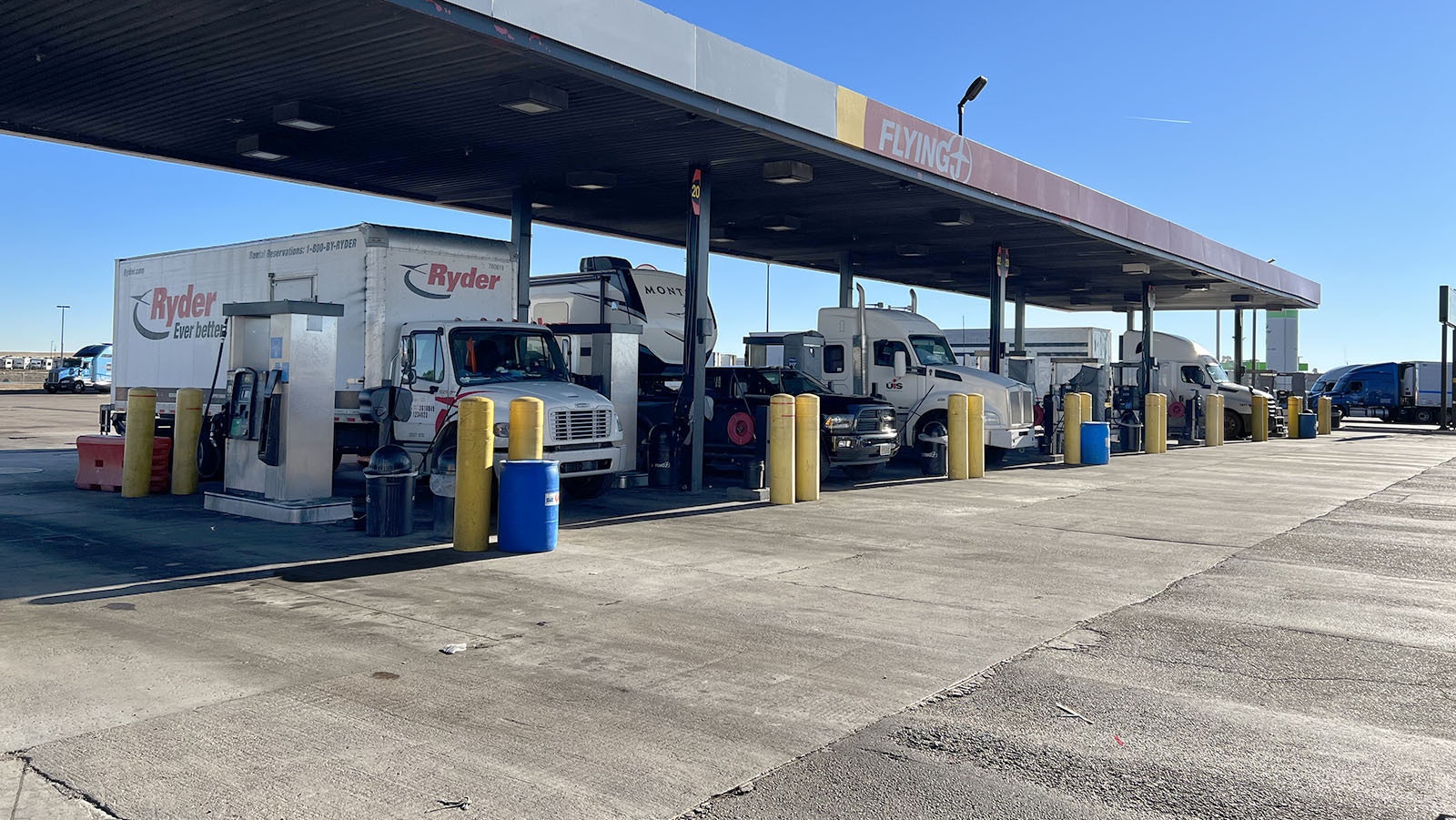The supply of diesel in the United States has dropped to its lowest seasonal level since 1945, according to federal data, meaning there’s less than a month of the fuel stockpiled in the country.
Wyoming gas distributors have struggled with a lack of refining capacity, and now the impacts of a corresponding nationwide capacity shortball is hitting the U.S.
Steve Gosbee, manager for Dooley Oil Inc.’s Cheyenne location, said it’s quite possible that Wyoming will see rolling outages of fuel.
“We’re, in my opinion, literally headed for disaster,” Gosbee said.
While most people encounter the problem most directly when they pay high prices for gas or diesel at the pump, if supplies get low enough to limit shipping and industry, grocery store shelves go empty, farm equipment doesn’t run and people lose jobs.
Just Not Enough Fuel
There are four refineries operating in Wyoming, according to the Energy Information Administration. Prior to 2020, the state had five.
Two of those were converted in the past few years to renewable diesel products, which are shipped to California.
Gosbee said there used to be a lot more options for sourcing refined petroleum products in Wyoming, but now almost all of their supply comes from Denver.
Dooley truckers will line up for six hours or more outside refineries, and sometimes the supply runs out, Gosbee said. Because of safety restrictions on how many hours truckers can work in a day, distributors don’t have a lot of flexibility to send truckers to seek out other supplies when one refinery runs dry.
“There’s just not enough fuel to go around in Wyoming,” Gosbee said.
He said distributors are concerned what happens if rail traffic and airline traffic increase in the coming months. That will just add to the stress on limited supplies.
Representatives of Dooley were among the distributors who testified for a working group Gov. Mark Gordon had tasked with finding solutions to Wyoming’s high gas prices. The group noted that Wyoming refineries are operating at 95% capacity, which is true of most refineries in the nation.
Even if it weren’t for federal opposition to oil and gas production, Wyoming wouldn’t be able to refine an increased crude oil supply, the working group concluded.
Bedrocks Of Modern Society
Joshua Jemente, director of government affairs for HF Sinclair, testified on the issues this week at the Wyoming Minerals, Business and Economic Development Committee. He said the supply issues could last 12 to 18 months, but HF Sinclair remains committed to the petroleum industry.
“We believe that gasoline, diesel and jet fuel are the bedrocks of modern society, and are going to be around for the foreseeable future,” Jemente said.
The high gas prices in Wyoming, he explained, are in part due to the war in Ukraine and sanctions on exports and imports to Russia. Additionally, European policies limit refining in those countries. That means refineries on the U.S. Gulf Coast are exporting about 1 million barrels per day of gasoline, diesel and jet fuel to European countries.
Jemente said policies in Washington and California, as well as other states, are displacing traditional gasoline products. California Gov. Gavin Newsome announced his state will ban sales of all gas-powered cars by 2035, for example, as well as other fuel-standards and emissions-limiting programs. Federal taxes on crude oil also increased under the Inflation Reduction Act.
All of these policies are greatly increasing the cost of producing fuel products or making investments in refining capacity unattractive.
“We’re seeing this kind of play out in real time where we have skyrocketing costs on consumers,” Jemente said.
Industrial Zone
Sen. Ed Cooper, R-Ten Sleep, pointed out that Wyoming exports most of the electricity it produces, as well as much of the oil produced in the state.
“We’re really good at exporting things … and with that, we export our jobs,” Cooper said.
Cooper asked Jemente what Wyoming could do to encourage HF Sinclair to reinvest in Wyoming.
Jemente said that refineries are not attractive investments for companies and many are getting out of the business. HF Sinclair has picked up some of these assets and now operates seven refineries in the U.S.
Rep. Scott Heiner, R-Green River, told Cowboy State Daily it’s encouraging that HF Sinclair sees long-term potential in refining, but there’s not a lot the state can do to change the political winds in Washington, D.C., or California. However, California, like many states, wants the renewable diesel refined in Wyoming.
“Wyoming is becoming the industrial zone for these more liberal states that don’t want to want the industry in their backyard, but they want all the benefits from the industry,” Heiner said.
Relief At The Pump
Heiner said that since building new refineries would never find approval with the EPA, the Wyoming Legislature is going to work with HF Sinclair to find ways to improve efficiencies and remove bottlenecks so Wyoming can get the most out of its refining capacity.
Gosbee said that the solution is simple — we need more gas, diesel and jet fuel. And the way to get there is more capacity. He thinks the state should look at bankrolling a new refinery and figuring out a way to fast-track permitting.
“The only way that you’re ever going to see relief at the pump, in my opinion, is having more supply. It’s just so tight right now,” Gosbee said.





